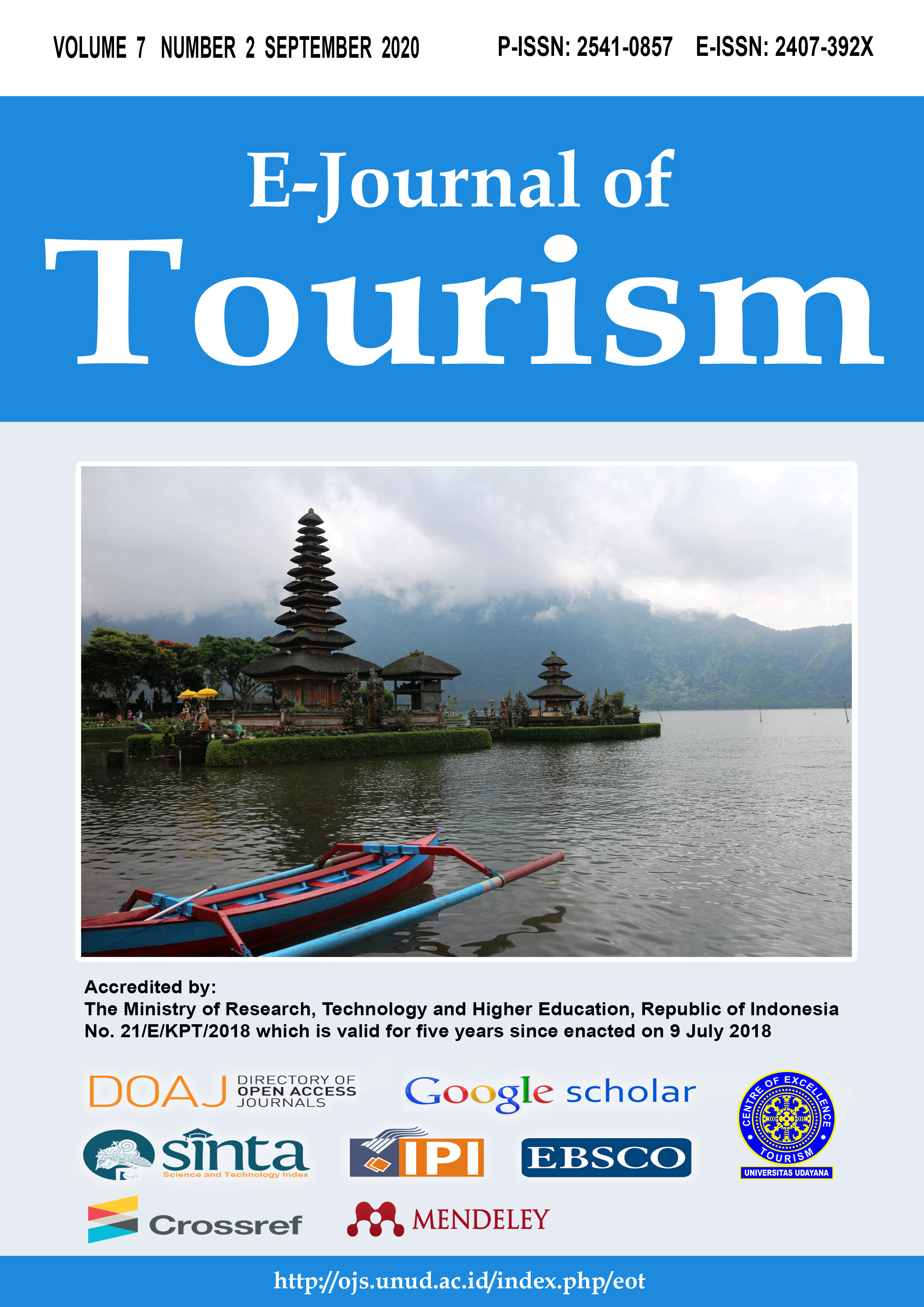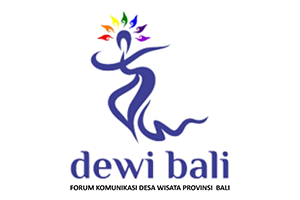Study on Ecotourism Development in Kapota Island Wakatobi Regency, Southeast Sulawesi Province
Abstract
The current paper aims to identify the distribution of ecotourism attractions, identify the strengths, weaknesses, opportunities, and threats of ecotourism development, as well as formulate appropriate development strategies. Qualitative descriptive analysis was employed by relying on various methodologies including direct observation, unstructured interview, focus group discussion, and documentation study. It was found that Kapota Island possesses tremendous ecotourism resources and potentials due to its abundant biodiversity, such as coral reefs, mangroves, seagrass meadows, beaches, dive spots, cave, lake, landscapes, customary and traditional culture, as well as historical heritages. The island’s diversity and uniqueness remain pristine/maintained due to the support given by the Wakatobi National Park Office (Balai Taman Nasional Wakatobi – TNW), customary institutions, and local communities. Accordingly, future development strategies include: (a) integration in the development of ecotourism destinations, local island based industry, collaborative marketing through digital tourism and organization of local operators; (b) orientation towards community based ecotourism to strengthen empowerment and participation of local communities; (c) capacity building of ecotourism actors and operators (tourism awareness group, Kapota customary institution, and Village Owned Enterprise administrators); and (d) increase of collaborative capacity among stakeholders.
Keywords: Conservation, Development, Ecotourism, Kapota Island
Downloads
References
Arida, I. N. S., and Rohman. 2019. Perencanaan Pariwisata and Keberlanjutan: Potret Perencanaan Pariwisata di Karangasem, Bali. Denpasar: Cakra Media Utama.
Arida, I. N.S., Baiquni, M., Damanik, J., and Ahimsa-Putra, H. S. 2014. Dinamika Ekowisata Tri Ning di Bali: Problematika and Strategi Pengembangan Tiga Tipe Ekowisata di Bali. Kawistara, 4(2), 111–127.
Buckley, R. 2003. Case Studies in Ecotourism. Cambridge: CABI.
Butcher, J. 2007. Ecotourism, NGOs and Development: A critical analysis. London: Routledge.
Ceballos-Lascurain, H. 1996. Tourism, Ecotourism, and Protected Areas: The State of Nature-based Tourism Around the World and Guidelines for Its Development. IUCN: Cambridge. [The World Conservation Union].
Damanik, J and Weber, H.F. 2006. Perencanaan Ekowisata: Dari Teori ke Aplikasi. Yogyakarta: Andi.
Diamantis, D. 1999. The Concept of Ecotourism: Evolution and Trends. Current Issues in Tourism, 2(2&3), 93-122.
Dinas Pariwisata Kabupaten Wakatobi. 2015. Masterplan Pariwisata Kabupaten Wakatobi 2016-2026. Wakatobi: Dinaspar.
Dowling, R.K and Fennell, D.A. 2003. “The Context of Ecotourism Policy and Planning”. In Fennell, D.A and Dowling, R.K (ed.), Ecotourism Policy and Planning (pp. 1-20). Oxon: CABI Publishing.
Eusébio, C., Vieira, A. L., Lima, S. 2018. Place attachment, host–tourist interactions, and residents’ attitudes towards tourism development: The case of Boa Vista Island in Cape Verde. Journal Sustainable Tourism, 26, 890–909.
Fandeli, C and Mukhlison. 2000. Pengusahaan Ekowisata. Yogyakarta: Kerja sama Fakultas Kehutanan UGM, Pustaka Pelajar, and Unit Konservasi Sumber Daya Alam DIY.
Fennel, D. A. 2002. Ecotourism Programme Planning. Wallingford, UK: CABI Publishing.
Hawkins, D.E and Lamoureux, K. 2001. “Global growth and magnitude of ecotourism”. In D.B. Weaver (ed.), The Encyclopedia of Ecotourism (pp. 63-72). UK: CABI Publishing.
Hirotsune, K. 2011. “Tourism, Sustainable Development and Ecotourism in Developing Countries.” Paper presented on ANDA International Conference, Nagoya University, Japan, March 5-7.
International Ecotourism Society. 2005. Research (statistics and fact sheets), available at http://www.ecotourism.org (accessed Juni 29, 2020).
Jenkins, C. L. 2015. Tourism Policy and planning for developing countries: some critical issues. Journal of Tourism and Recreation Research, 40(2), 144-156.
Kementerian Desa, Pembangunan Daerah Tertinggal, and Transmigrasi. 2018. Rencana Pembangunan Kawasan Perdesaan (RPKP) Kabupaten Wakatobi. Laporan Akhir. Jakarta.
Khalid, S. Ahmad, M. S., Ramayah, T., Hwang, J., and Kim, I. 2019. Community Empowerment and Sustainable Tourism Development: The Mediating Role of Community Support for Tourism. Sustainability, 11, 6248; doi:10.3390/su11226248.
KLHK (Kementerian Lingkungan Hidup and Kehutanan). 2019. Laporan Kinerja Direktorat Jenderal Konservasi Sumber Daya Alam and Ekosistem 2019. Jakarta: KLHK.
Marzouki, M., Froger, G., and Ballet, J. 2012. Ecotourism versus Mass Tourism. A Comparison of Environmental Impacts Based on Ecological Footprint Analysis. Sustainability, 4, 123-140. doi:10.3390/su4010123.
Muhtadi, D. 26 Juli 2012. UNESCO Tetapkan Laut Wakatobi Sebagai Cagar Biosfir https://sains.kompas.com/read/2012/07/26/13111438/UNESCO.Tetapkan.Laut.Wakatobi.Sebagai.Cagar.Biosfir.
Namugenyia, C., Nimmagaddab, S. L., and Reinersc, T. 2019. Design of a SWOT Analysis Model and its Evaluation in Diverse Digital Business Ecosystem Contexts. Procedia Computer Science 159, 1145–1154
Nasrun. 2016. Partisipasi Masyarakat dalam Pengelolaan Ekowisata Bahari di Pulau Kapota Taman Nasional Wakatobi. Tesis. Yogyakarta: Magister Kajian Pariwisata Universitas Gadjah Mada.
Nazir, M. 2011. Metode Penelitian. Jakarta: Ghalia Indonesia.
Nyumba, T. O., Wilson, K., Derrick, C., and Mukherjee, N. 2018. The use of focus group discussion methodology: Insights from two decades of application in conservation. Methods in Ecology and Evolution, 9, 20–32.
Panos Media Briefing. 1995. Ecotourism: Paradise gained, or paradise lost? London: Panos.
Rafika. 2011. Perencanaan Jalur Interpretasi Alam di Pulau Kapota, Taman Nasional Wakatobi. Skripsi. Institut Pertanian Bogor. Bogor.
Republik Indonesia. 2009. Unandg-Unandg Republik Indonesia Nomor 10 Tahun 2009 tentang Kepariwisataan. Jakarta.
Republik Indonesia. 2011. Peraturan Pemerintah Nomor 50 Tahun 2011 tentang Rencana Induk Pembangunan Pariwisata Nasional (Ripparnas). Jakarta.
Sadikin, P. N., Arifin, H. S., Pramudya, B., and Mulatsih, S. 2017. Carrying capacity to preserve biodiversity on ecotourism in Mount Rinjani National Park, Indonesia. Biodiversitas, 18(3), 978-989. DOI: 10.13057/biodiv/d180316.
Salazar, N. B. 2007. Small is Successful: The Lure of Small-Scale Tourism Development and Transnational Networking, pp. 396-420. In: A. Raj (Ed.), Sustainability Profitability and Successful Tourism. New Delhi: Kanishka Publishers.
Sari, I. P. 2017. Konflik Kepentingan dalam Pengembangan Pariwisata: Kasus Pulau Kapota, Wakatobi, Sulawesi Tenggara. Tsaqofah & Tarikh, 2(1): 29-38.
Scheyvens, R. 1999. Ecotourism and the employment of local communities. Tourism Management, 20, 245-49.
Snyman, S. 2017. The role of private sector ecotourism in local socio-economic development in southern Africa. Journal of Ecotourism, 16(3), 247–268.
Stein, T.V. 2004. Things to know about offering naturebased tourism on private forestlands in Florida. Florida Forests, 8(1), 6–10.
Suhandi, A. S. 2020. Adaptasi Pengelolaan Ekowisata Pasca Covid 19. Makalah 25 Tahun Indecon. Jakarta.
Sumarno, E. 2016. Pulau Kapota The Small Hiden Paradise. September 2016 (https://foresteract.com/pulau-kapota-the-small-hidden-paradise), diakses 21 Mei 2020.
Supriatna, J. 2008. Melestarikan Alam Indonesia. Jakarta: Yayasan Obor Indonesia.
Wahab, S. 1989. Manajemen Kepariwisataan. Pradnya Paramita. Jakarta
Wallace, G. N and Pierce, S.M. 1996. An Evaluation of Ecotourism in Amazonas, Brazil. Annal of Tourism Research, 23(4), 843-873.
Western, D. 1997. “Memberi Batasan Tentang Ekoturisme.” In: K. Lindberg and D. E. Hawkins (Eds.), Ekoturisme: Petunjuk untuk Perencana and Pengelola (trnsl.). Jakarta. PACT and ALAMI.
World Travel and Tourism Council. 2004. Tourism Satellite Accounting 2004: Executive Summary. On WWW at (http://www.wttc.org/2004tsa/PDF/Executive%20Summary.pdf). Accessed April 2005.
WWF. 2017. Satu Dekade Pengelolaan Taman Nasional Wakatobi: Keberhasilan and Tantangan Konservasi Laut. Jakarta: WWF.
Yulius., Novianti, N., Arifin, T., Salim, H. L., Ramdhan, M., and Purbani, D. 2015. Distribusi Spasial Terumbu Karang di Perairan Pulau Wangi-Wangi, Wakatobi. Jurnal Ilmu and Teknologi Kelautan Tropis, 7(1), 59-69.

This work is licensed under a Creative Commons Attribution 4.0 International License.
The copyright of the received article shall be assigned to the journal as the publisher of the journal. The intended copyright includes the right to publish the article in various forms (including reprints). The journal maintains the publishing rights to the published articles.




















